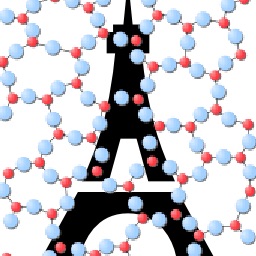Percolative heterogeneous topological constraints and fragility in glass-forming liquids
We present a precise atomic scale approach to topological rigidity theory of sodium silicate glasses and liquids which contain temperature-dependent constraints. Using molecular dynamics simulations, the spatial distribution of such constraints is followed as a function of temperature and pressure. Results show that the distribution of constraints broken by thermal activation is not homogeneous in the system. The spatial extent of these flexible regions shows a percolative behavior at a characteristic temperature which is deeply connected to flexible-to-rigid transitions, and influences the fragility of the glass-forming liquid.
